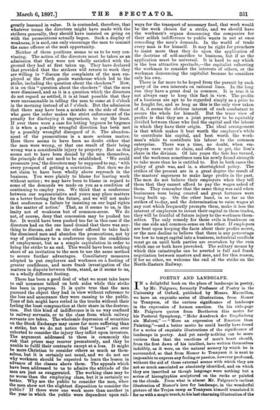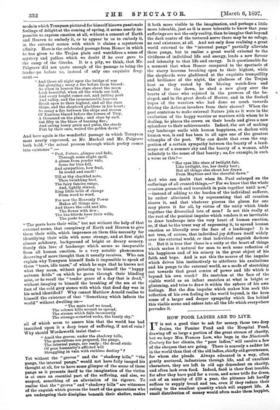POETRY AND LANDSCAPE.
IN a delightful book on the place of landscape in poetry, by Mr. Palgrave, formerly Professor of Poetry in the University of Oxford, published by Messrs. Macmillan, we have an exquisite series of illustrations, from Homer to Tennyson, of the curious significance of landscape in the expression of human emotion. On his title-page Mr Palgrave quotes from Beethoven this motto for his Pastoral Symphony, " Mehr Anadruck der Ernpfindung ala Malerei," — "More an expression of Emotion than Painting,"—and a better motto he could hardly have found for a series of exquisite illustrations of the significance of landscape in poetry. And yet surely nothing can be more curious than that the emotions of man's heart should, from the first dawn of his intellect, have written themselves indelibly, as it were, on the natural scenery by which he is surrounded, so that from Homer to Tennyson it is next to impossible to express any feeling or passion, however profound, without the aid of those external scenes with which they are not so much associated as absolutely identified, and on which they are inscribed as though language were nothing but a series of hieroglyphics sculptured on the rocks or painted on the clouds. From what is almost Mr. Palgrave's earliest illustration of Homer's love for landscape, in the wonderful picture of the Trojan camp as Tennyson himself translated it for us with a magic toucb,to his last charming illustration of the
mode in which Tennyson pictured for himself hisown passionate feelings of delight at the coming of spring, it seems nearly im- possible to express emotion at all, without a consent of Earth and Heaven to embody it, or to appear to us to embody it, in the external scenes with which it claims a mysterious affinity. Here is the celebrated passage from Homer in which he has given to the Trojan plain and watchfires a sense of mystery and pathos which we doubt if he ever gave to the camp of the Greeks. It is a pity, we think, that Mr. Palgrave did not quote enough of the passage to bring the landscape before us, instead of only one exquisite frag- ment :—
" And these all night upon the bridge of war Sat glorying ; many a fire before them blitzed : As when in heaven the stars about the moon Look beautiful, when all the winds are laid, And every height comes out, and jutting peak And valley, and the immeasurable heavens Break open to their highest, and all the stars Shine, and the shepherd gladdens in his heart; So many a fire between the ships and stream Of Xanthus blazed before the towers of Troy, A thousand on the plain ; and close by each Sat fifty in the blaze of burning fire ; And eating hoary grain and pulse, the steeds Fiat by their cars, waited the golden dawn."
And here again is the wonderful passage in which Tennyson most nearly expressed, as Mr. Mackail and Mr. Palgrave both hold, " the actual process through which poetry comes into existence " :—
" Past, Future, glimpse and fade,
Through some slight spell, A gleam from yonder vale, Some far blue fell, And sympathies, how frail, In sound and smell Till at thy chuckled note, Thou twinkling bird, The fairy fancies range, And, lightly stirred, Ring little bells of change From word to word.
For now the Heavenly Power Makes all things new, And thaws the cold and fills The flower with dew ; The blackbirds have their wills, The poets too."
" The poets have their wills," but not without the help of that external scene, that conspiracy of Earth and Heaven to give them their wills, which impresses on them this necessity for identifying their wills with some strange, and at first sight almost arbitrary, background of bright or dreary scenery. Surely this love of landscape which seems so inseparable from all human emotion, is a very notable phenomenon deserving of more thought than it usually receives. Who can explain why Tennyson himself finds it impossible to speak of those "tears, idle tears," of which he says that he knows not what they mean, without picturing to himself the "happy autumn fields" on which he gazes through their blinding mist, or to recall the " tender grace of a day that is dead," without imaging to himself the breaking of the sea at the foot of the cold grey atones with which that dead day was in his mind identified? Why cannot Matthew Arnold realise to himself the existence of that "Something which infects the world" without dwelling on- " The mute turf we tread, The solemn hills around us spread, The stream which falls incessantly
The strange-scrawled rocks, the lonely sky,"
all of which seem to assure him that the world has had inscribed upon it a deep trace of suffering, if not of ruin P W by should Wordsworth insist that—.
" Amid the groves, under the shadowy hills, The generations are prepared, the pangs, The internal pangs, are ready; the dread strife Of poor humanity's afflicted will
Struggling in vain with ruthless destiny" ?
Yet without the " groves " and the "shadowy hills," "the pangs, the internal pangs," would not have fully imaged his thought at all, for to have some glimpse of the scene of these pangs as it presents itself to the imagination of the victim is at once an essential part of the suffering, and also, we suspect, something of an alleviation of its rigours. To realise that the " groves " and " shadowy hills " are witnesses of the anguish which pierces the heart of the generations who are undergoing their discipline beneath their shelter, makes it both more visible to the imagination, and perhaps a little more tolerable, just as it is more tolerable to know that your sufferings are not the only reality, than to imagine that beyond the dark centre of the tortured nerve there may be no refuge, no real existence, at all. And not only does realising a great world external to the "internal pangs" partially alleviate these pangs, but to realise a great world external to the vividness of individual life and energy, lends a new flavour and intensity to that life and energy. Is it questionable for a moment that when Homer compared to the spectacle of the starry heavens breaking open to their highest, while the shepherds were gladdened at the exquisite tranquillity and brilliance of the night, the gladness of the Trojan host as they rested by the blazing watch-fires and waited for the dawn, he shed a new glory over the hearts of those who rejoiced in the prowess of the be- sieged, and in the great deeds of Hector, and in the flushed hopes of the warriors who had done so much towards driving the Adman invaders from their shores P When the poet contrives to make external Nature join as it were in the exultation of the happy warrior or warriors with whom he is dealing, be places the crown on their heads and gives a new splendour to their achievements. Indeed, the art of making any landscape smile with human happiness, or darken with human woe, is and has been in all ages one of the greatest triumphs of the poet. Who can doubt that even the sug- gestion of a certain sympathy between the beauty of a land- scape or of a summer sky and the beauty of a woman, adds infinitely to the sense of that beauty ; as, for example, in such a verse as this ?—
" Her eyes like stars of twilight fair, Like twilight, too, her dusky hair; But all things else about her drawn From Maytime and the cheerful dawn."
And who can doubt that when St. Paul enlarged on the sufferings of all created things,—" For we know that the whole creation groaneth and travaileth in pain together until now,"
—instead of adding to the burden of the individual sufferer, he rather alleviated it by representing that all creation shares it, and that whatever pierces the gloom for one may pierce it for all, by virtue of the unity which binds together the diversified lots of men ? Is not this really at the root of the poetical impulse which renders it so inevitable to draw landscape into the very heart of human emotion, or, if that be the truer way of expressing it, to spread human emotion so liberally over the face of a landscape? It is not true, of course, that individual joy diffuses itself widely over the external world, or that individual anguish darkens it. But it is true that there is a unity at the heart of things which makes it natural for man to seek some reflection of his happiness and of his misery in the great object of his faith and hope. And is not this the source of the impulse which drives him instinctively to attribute his exaltations and his pangs to the external world, as a mode of stretching out towards that great centre of power and life which is beyond his own reach P He snatches at the face of the visible world as an infant snatches at what is bright or glistening, and tries to draw it within the sphere of his own feelings. But the dim impulse which makes him seek this reflection of his own feeling in the world beyond, is the keen sense of a larger and deeper sympathy which lies behind this visible scene and enters into all the life which everywhere pervades it.







































 Previous page
Previous page